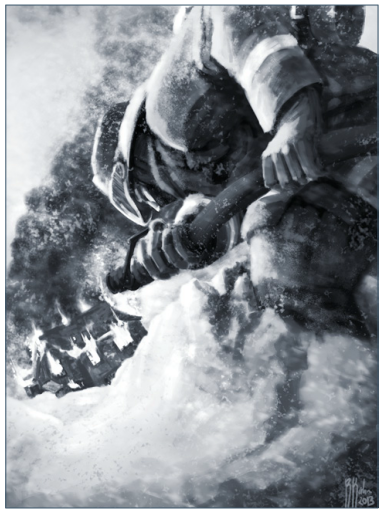In my last Page XX column I promised a rule for a rare instance of procedural resolution. This occurs when the caller of the scene wants to be surprised by the outcome of an external event. I admit to being surprised that people want this, but it turns out that a few groups do. It does fit certain genres where the group works together toward a common goal that regularly repeats itself. This might apply to series set in the worlds of sport, the arts, or around other occupations.
In the standard procedural system seen in Hillfolk, you fail more frequently than you would in a standard adventure-oriented RPG. Compelling drama arises from failure, from the tightening of the screws on the characters. So the system skews to that, just as action and investigation games like GUMSHOE and 13th Age favor success.
By contrast, the Surprise Outcome resolution option outlined below assumes a 50/50 shot of success, which you can calibrate in whichever direction you prefer to allow for the desired possibility of surprise.
Surprise Outcome Procedural Resolution
The caller poses a yes or no question about a possible procedural outcome:
“Will Chessboard win the race, beating Percival’s horse?”
“Will our band have a great gig?”
“Will this be the time when one of the firefighters gets hurt?”
The caller then draws a card from a freshly shuffled deck. If the result is an 8 or higher, the answer to the question is Yes. If not, the answer is No.
When the card is revealed, the scene caller narrates accordingly, then frames the dramatic interaction arising from it.
A surprise procedural outcome never counts as a scene unto itself. It is always a prelude to a scene.
Callers seeking additional complication can specify any card as the target to hit, allowing adjustment of the odds upwards or downwards from roughly even. (Well, 54%, but this is DramaSystem so who’s counting?) I’m not sure why you’d bother to call for a surprise and then skew the odds to lessen the chance of having one, but there you go. Each card represents a difference in odds of roughly 7%. So if you want a 21% chance of success, make the target a Queen or better. For a slim 21% chance of failure, make it a 5 or better.
DramaSystem doesn’t use dice or coins or spinners but if you’d rather substitute a randomizing method of your choice, it is unlikely that the Great Pelgrane will swoop from its perch in Clapham Common to devour you.




